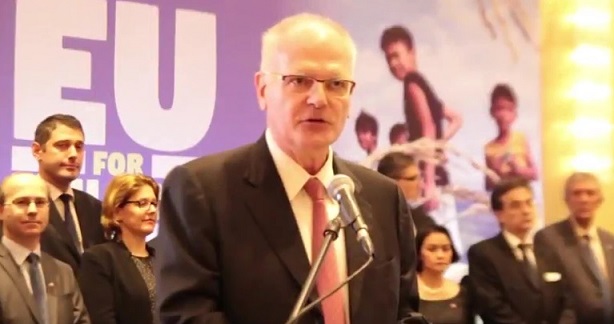
President Duterte’s solution to the country’s problems is “kill, kill.”
The 28-member state European Union has made it clear that they will not allow their money to be used to kill people.
Anticipating a removal of the Philippine’s favored status under EU’s Generalized Scheme of Preferences wherein tariff on Philippine goods for export to the EU is lowered or removed based on the Philippine government’s compliance with at least 27 agreements and treaties on human rights, labor, environment and governance, the Duterte government announced that it will no longer receive aid from EU.
Duterte considers conditions attached by EU to their aid as interference in the internal affairs of the Philippines.
European Union ambassador Franz Jessen said the Duterte government’s decision would mean the loss of about 250 million euros (P13.89 billion) worth of grants mostly allocated to Muslim communities.
Malacanang knew it was coming. EU Trade Commissioner Cecilia Malmstrom who was here recently for 15th Asean Economic Ministers-EU Trade Commission Consultation expressed concern over the Philippines’ move to reinstate death penalty, the unabated cases of extra-judicial killing and the efforts in the Duterte-controlled House of Representatives to lower the minimum age for criminal liability from 15 years old to nine years old.
At the celebration of Europe Day Tuesday last week Jessen delivered a message that reading it more closely now had hints of warning underneath the diplomatic language.
Jessen said, “Whatever events may bring in the future, one thing is certain: the EU will continue to put promoting international peace and security, development cooperation, human rights and responding to humanitarian crises at the heart of its foreign and security policies. Europe is gradually increasing its hard power, but at the same time, we do remain a soft power, believing strongly that most solutions, within countries and among countries, require, not hard power, but soft power.”
He stressed the great importance EU puts on human rights, which is poison to Duterte.
Jessen underscored that this year’s Europe Day celebration worldwide is focused on the promotion of rights of children and youth.
“The EU takes children’s and youth’s rights seriously; it is one of the key priorities of the EU external human rights policy. We are a key supporter of the United Nation’s Convention on the Rights of the Child and we have consistently advocated for its implementation within the EU and in third countries. The EU is committed to enforcing children’s and youth rights to protect them from threats such as violence, child labor, armed conflict and sexual exploitation. “
Jessen sounded a hint of warning reminding of EU’s economic clout:” Let me also stress that the EU is the second largest global economy. We are the largest global market and the leading foreign investor in most parts of the globe. The EU has achieved this strong position by acting together with one voice on the global stage, by playing a key role in removing barriers to trade as a member of the World Trade Organization, as well as concluding bilateral trade deals with many important partners around the world — such as the recent CETA deal with Canada. The EU will continue to take a leading role in promoting free trade among countries.”
Lest the Duterte government, which is currently basking in China’s generosity, forget, Jessen issued a reminder that the EU, with 28 member countries that include Germany and France, is the largest foreign investor in the country, providing an estimated 500,000 jobs.
“Since December 2015, the Philippines is the only ASEAN country to enjoy the concrete benefits of the Special Incentive Arrangement for Sustainable Development and Good Governance, GSP+ status, with duty free exports of 66% tariff lines, worth around €1.6 billion in 2016. These economic gains help the country not only economically, but also to strengthen implementation of core international conventions on labor rights, environment protection, governance and human rights,” he said.
Sen. Antonio Trillanes IV, a consistent critic of Duterte, said “ The rejection of the EU aid is another reckless and whimsical decision by the Duterte administration. Instead of being arrogant and hateful, as president of a developing country, Duterte ought to be grateful that there are donor countries that are concerned about the plight of our countrymen and are willing to help us.”
The other day, Malacañang announced the appointment of former Senate President Edgardo Angara as special envoy to the EU.
A most challenging job awaits Angara.
and yet, peace talks is still going on in netherlands, gratis ng dutch govt.
sana hindi husgahan ng kasaysayan ang ginagawa ni du30 na sobra ng pagsipsip sa mapanuksong china na siya ay isang makabagong hudas na ipinagkanulo ang sariling bansa kapalit ng ilang yuan na babayan naman ng mga susunod na siglong pinoy
Dahil sa amor propio ng isang baliw at uhaw sa dugong Pangulo, mas ninais pa nito ang UTANG sa mga Intsik kesa sa tulong or ayuda mula sa EU. Talagang malala na ang kanser sa utak ng Pangulong ito.,
sa mga nagdaang EU grants, sino ang nakinabang? saan napunta ang mas malaking bahagi nito? pinakinabangan ba ng ordinaryong pilipino?
tanungin nyo ang CHR at sina Mar Roxas.